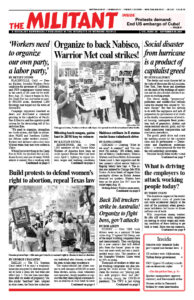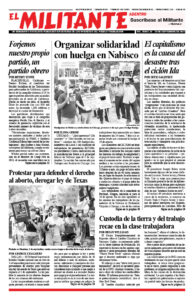The disastrous impact of the worldwide capitalist crisis of production and trade accelerated sharply at the start of the pandemic when government lockdowns led bosses to throw millions out of work.
With competition among workers for jobs still severe today, employers are moving to attack wages and working conditions of those seeking to get back to work. More two-tier contracts, job combinations, speedup, subcontracting and draining work schedules are demanded by bosses trying to hold down wages while prices rise at their fastest rate in 30 years.
This is exacerbated in the U.S. by the shutdown of special pandemic relief programs. Over 10.5 million workers saw the elimination of federal pandemic unemployment payouts Sept. 6, backed by both Republicans and by the White House. A few weeks earlier, government restrictions on evictions expired.
Underlying these attacks is an intensification of capitalists’ competition worldwide as some markets begin to open up. Bosses’ profit rates worldwide were expected to drop by 8% this quarter, Reuters says. Declining factory output in China, coronavirus infections across Asia and overwhelmed ports deepen their problems. Blaming parts shortages, bosses at Toyota, the world’s largest automaker, announced the closure of 14 plants in Japan last month, with more to come, Volkswagen, General Motors and Ford all say they’re scaling back production, at a time when there is growing demand for cars.
The Port of Los Angeles broke container handling records for each one of the last 13 months, but hasn’t dented the rising number of vessels idling outside the port waiting for a berth. Shortages and disruption like this are not caused solely by the pandemic. They are built into the anarchy of capitalist production as bosses seek to maximize profits, with no thought to production, distribution and planning to meet human needs.
As new waves of coronavirus spread across Southeast Asia, manufacturing contracted last month in Indonesia, Vietnam, the Philippines and Malaysia, countries where fewer than one-fifth of the population are vaccinated. U.S. pharmaceutical bosses obstruct the production of vaccines — and defend superprofits — by keeping their patents secret.
Instead of increasing investment in plant and equipment that could expand hiring, capitalists have instead poured $3.9 trillion into mergers and acquisitions worldwide so far this year. Such deals will soon overtake the record set in 2007, just before the financial crash, predicts the Financial Times.
Wherever bosses do enter into production, they’re determined to profit off workers’ backs and confront workers standing up to defend hard-fought gains made in previous union struggles.
At the same time, prices for basic necessities are rising much faster than government-reported inflation rates. Over the last year, chicken has risen 13% and fish 11%. The Senior Citizens League reports millions of the elderly are skipping meals, visiting food pantries or attempting to get food stamps.
Growing willingness to fight boss attacks
“In the face of these conditions the strikes by miners at Warrior Met Coal in Alabama, bakery workers at Nabisco and others fighting to raise wages and defend working conditions set an example to all workers,” Joanne Kuniansky, Socialist Workers Party candidate for New Jersey governor, told the Militant. “Organizing union solidarity with these fights is essential.”
Union membership is only 6.3% in the privately employed workforce. At the same time, the Gallup poll shows approval of unions is running at 68% today, the highest since 1965. This shows more workers are looking for a weapon to hold off bosses’ attacks.
“The biggest single challenge workers and our unions face is organizing a fight for jobs,” Kuniansky said. In addition to the 8.4 million officially unemployed today, some 4.5 million people work part time but would prefer full-time work, and millions more have given up looking for work altogether and are no longer counted as unemployed by the government.
“Unemployment and inflation must be met by unions leading a fight for 30 hours work for 40 hours pay to spread the work around and prevent layoffs, and cost-of-living adjustments so that every time prices rise our wages and benefits go up,” she said.
SWP candidates call for unions to fight for a federally funded public works program to put millions back to work at union-scale wages, to build the hospitals, housing, schools and more that working people need.
“We need to break from the dead end of backing the bosses’ Democratic and Republican parties, and build our own party — a labor party based on the unions — that can centralize the struggles of all those exploited and oppressed by capital,” Kuniansky said. “It would unify and lead millions of working people to bring an end to capitalist rule, establish a workers and farmers government and reach out a hand to workers worldwide to join in carrying through a socialist revolution.”

